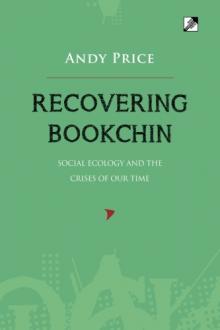Author/journalist Debbie Bookchin and ISE Board member Bea Bookchin offer this in-depth review of Andy Price’s new book, Recovering Bookchin (New Compass Press, November 2012):
 In his important new book Recovering Bookchin,
Andy Price has set himself a formidable task: he takes up the corpus of
criticism of Murray Bookchin that developed during the last 20 years of
his life and disentangles the valid, content-based criticism, from the
many ad hominem and polemical attacks against Bookchin, showing
how the latter were used to almost completely obscure the former and
cast aside Bookchin’s substantive critique. Equally important, Price
addresses the content-based criticism, in the process illuminating the
richness of Bookchin’s theoretical and political philosophy and
restoring him to his rightful role as one of the most important radical
thinkers of the second half of the twentieth century.
In his important new book Recovering Bookchin,
Andy Price has set himself a formidable task: he takes up the corpus of
criticism of Murray Bookchin that developed during the last 20 years of
his life and disentangles the valid, content-based criticism, from the
many ad hominem and polemical attacks against Bookchin, showing
how the latter were used to almost completely obscure the former and
cast aside Bookchin’s substantive critique. Equally important, Price
addresses the content-based criticism, in the process illuminating the
richness of Bookchin’s theoretical and political philosophy and
restoring him to his rightful role as one of the most important radical
thinkers of the second half of the twentieth century.
While such a task might have resulted in a book reserved for those
already familiar with Bookchin’s work, that is not the case here: Price,
a senior lecturer in Politics at Sheffield Hallam University, U.K.,
provides such a clear rendering not only of Bookchin’s thought, but also
of the concerns of Bookchin’s critics, that his book serves also as one
of the most cohesive and readable introductions to the philosophy and
social theory of Murray Bookchin.
After describing the enormous impact that Bookchin’s ideas and
writing had on radical political thought prior to 1987, Price focuses on
two specific periods of Bookchin’s work. The first begins with the
Gathering of American Greens conference in Amherst in 1987 that
initiated the social ecology vs. deep ecology debate. The second begins
eight years later in 1995 with the social anarchism vs. lifestyle
anarchism, and subsequently, anarchism vs. communalism debates. Price
provides a detailed summary of the long literature in which these
debates and argumentation took place and shows that Bookchin’s
criticisms of these two movements stemmed not from an egotistical desire
to protect his turf, or some kind of querulous argumentative streak, as
his critics contended, but were compelled by the need to defend and
explicate the philosophical and political implications of his life’s
work. These interventions by Bookchin, Price explains, were “a direct
philosophical and political expression of his own theoretical
foundations.”